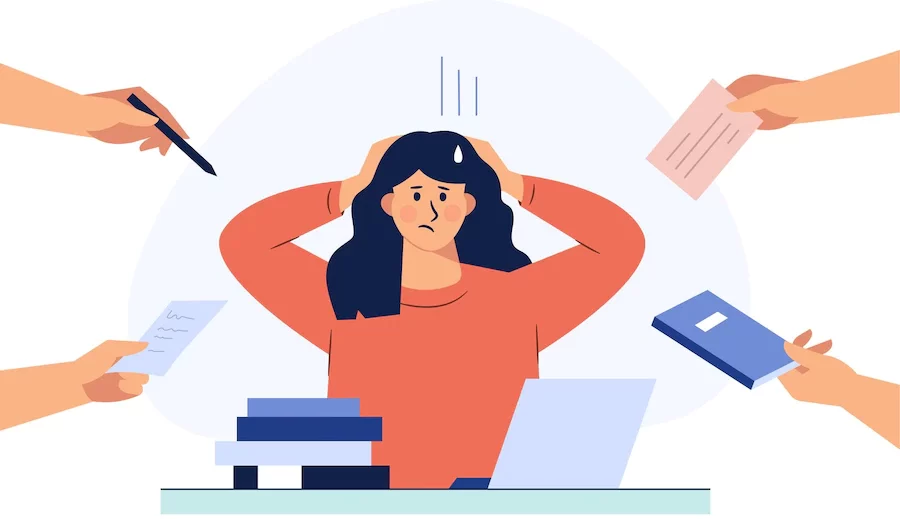How to Help Your Child Cope with School Stress?
- 1 What Can Cause Stress in Children?
- 2 Signs and Symptoms of Childhood Stress
- 3 8 Tips to Help Your Child Overcome School Stress
- 3.1 Respect children’s bedtime
- 3.2 Allow children time for leisure and recreation.
- 3.3 Set a time limit for homework by the school year.
- 3.4 Listen to your child.
- 3.5 Evaluate children’s efforts, not the final mark.
- 3.6 Never compare a child to their classmates.
- 3.7 Teaching children to organize themselves
- 3.8 Motivating children to plan homework
- 4 Final words
When we talk about stress, we usually associate it with adult problems (work, home, etc.), but we don’t associate it with children. Unfortunately, children also suffer from stress, and they are suffering from it more and more. Many factors can cause stress in a child, but we will focus on the stress they may be experiencing at school. We will tell you what can cause anxiety in children and how you can help them deal with school stress.
What Can Cause Stress in Children?
It seems easy to be a child: go to school, do my homework, write my essay, play, and that’s it. But now we professionals increasingly see that children’s schedules are full of activities and little time for recreation and play (which is very important for development).
Children go to school, sometimes very early, because they can’t combine schoolwork with their parents’ work. They attend extracurricular activities (one or two a week), do their homework (sometimes too much), study, ask you for PowerPoint presentation help, eat dinner and go to bed. And if you add to all of these possible difficulties or learning problems, the stress becomes another plus.
If we consider children’s school days, we see that they are often similar to adults’ school days. Children leave home at 7 a.m. and don’t arrive until 7 p.m. they have to do homework or study until 9 p.m., when they eat dinner, shower, and go to bed. Under such circumstances, it’s pretty standard to think that children might suffer from stress.
But it’s not just scheduled that stresses kids out. The volume of homework, the excess of exams (single, semester, global, preliminary…), the pressures and demands of parents, teachers, and themselves, and children’s personalities and self-esteem lead to stressful situations for which children have no strategies or tools to cope.
Signs and Symptoms of Childhood Stress
This condition of stress in children often manifests as:
- Sleep problems
- Behavioural disturbances
- Attention and concentration problems
- Anxiety, sadness, childhood depression
- Gastrointestinal issues, lack or excess of appetite
- Sudden and exaggerated fears
- Regression in some acquired behaviours (bed wetting, thumb sucking, night terrors….)
8 Tips to Help Your Child Overcome School Stress
And here, at this point, how parents handle these situations is very important. According to the best college paper writing services, you have to keep in mind these essential points:
Respect children’s bedtime
We should try to ensure they sleep the required hours according to age (8 to 10 hours).
Allow children time for leisure and recreation.
In addition to extracurricular activities such as soccer, judo, or robotics, children must enjoy playtime with their parents and siblings. This is an invaluable time for a child’s development.
Set a time limit for homework by the school year.
You need to set a time limit and create a routine and habit for doing homework. For example, in the second grade of elementary school, we should not spend more than one hour a day on homework, studying, writing essays, and reading.
Listen to your child.
Listening to children means respecting and helping them deal with their emotions about school and daily life. It is essential to talk to your children about their day and activities and share affection and experiences. If they need help, you can contact an essay writing service.
Evaluate children’s efforts, not the final mark.
Most parents say they appreciate the effort, but when they get an A, it’s not enough for us, and we tell the child they can get a better grade. And maybe they can, but then we will motivate them to improve next time, and we value the current grade.
Never compare a child to their classmates.
Comparisons are hateful and harmful to children’s self-esteem. They encourage children to be competitive, jealous, and envious.
Teaching children to organize themselves
Children must learn to organize themselves, their time, and tasks and take responsibility for them. The best way to manage time properly is to know how to organize it. Therefore, we can help children make a schedule with their activities and time for homework, play, or recreation.
Motivating children to plan homework
Children need to learn how to plan homework and work, so making a calendar for the month that lets them know right away when they have exams, when they have homework or worksheets to turn in, etc.. can help them plan so that things don’t get done at the last minute.
Final words
For this to impact children, it is essential that parents help them (which does not mean we do it for them) but that we guide and orient them until they can do it independently.
Suppose we suspect something is wrong with our child, that they have some of the signs we saw initially. In that case, it may be worth going to a paediatrician or child psychologist to assess the “seriousness” of the issue and help parents and the child themselves to deal with these situations and provide tools for emotional management and control, relaxation techniques, time management, etc… to help them deal with stressful situations that occur in their daily lives.



















